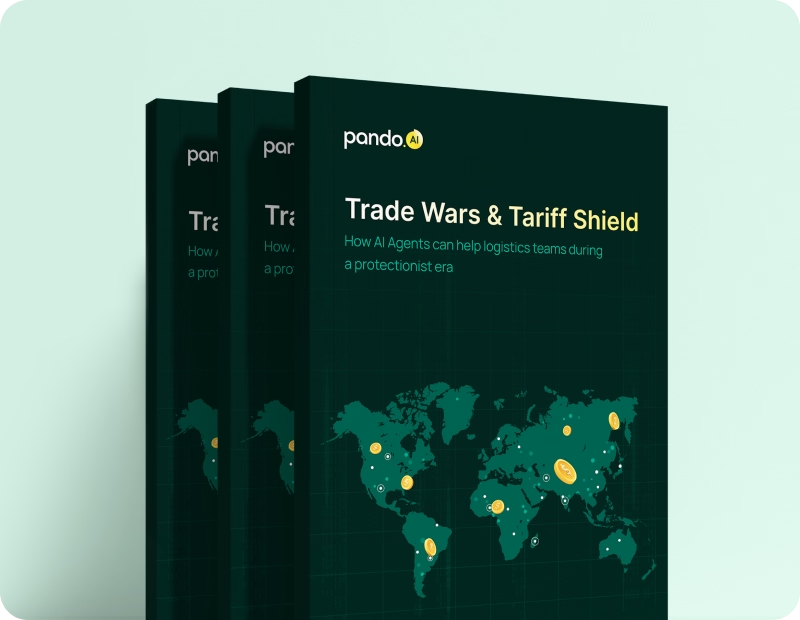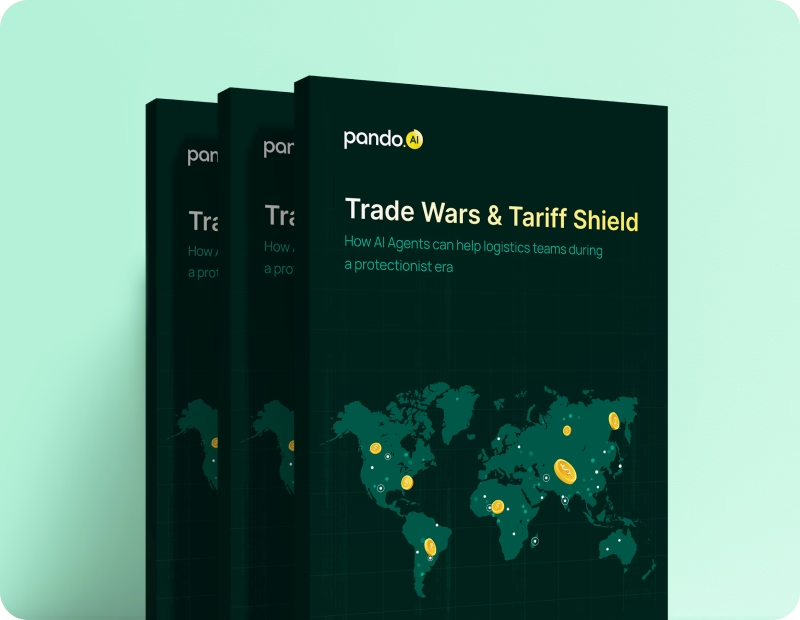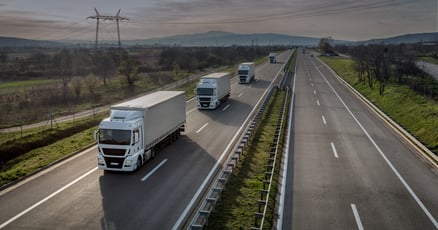-
Products Products
- Industry
- Initiatives
- Resources
- Company
- Book a demo
-
Products Products
- Industry
- Initiatives
- Resources
- Company
- Book a demo
From footprint to foresight: Measuring sustainability for a responsible supply chain
Discover key sustainability metrics and how to chart a course to achieving sustainability goals.
Published on March 6, 2024 • 6 mins read
Durga Pratiha

Discover key sustainability metrics and how to chart a course to achieving sustainability goals.
Sustainability is crucial for any manufacturer or retailer. Your actions directly impact the planet's future, from reducing emissions to embracing electric vehicles. Optimizing routes is one way to cut emissions. Investors and customers now demand accountability through ESG standards, making sustainability non-negotiable.
The significance of sustainability audits cannot be overstated. They evaluate environmental impact and ensure accountability. By collecting data like emissions factors, audits provide transparency and credibility. This helps in informed decision-making and targeted interventions.
But why should you prioritize sustainability audits in your logistics operations? Simple: you demonstrate a commitment to environmental stewardship and social responsibility. Moreover, you position your organization as a catalyst for change, driving innovation and setting industry benchmarks for sustainability excellence.
Metrics that matter
In your pursuit of sustainable logistics practices, understanding and harnessing key metrics is paramount. These metrics serve as guideposts, illuminating the path towards more efficient, eco-conscious operations.
- Unraveling scope 3 carbon emissions - Scope 3 carbon emissions, defined by esteemed standards like the GHG (Greenhouse gas) Protocols and GLEC (Global Logistics Emissions Council) framework, encompass the entirety of indirect emissions across your supply chain. These emissions, often the most challenging to quantify and manage, spotlight the interconnectedness of your operations with the broader environment. By accounting for Scope 3 emissions, you gain insight into the holistic impact of your logistics activities, from procurement to distribution.
- Emissions factors and global standards - Emissions factors, grounded in rigorous global standards, serve as the bedrock of emission calculations. These factors encapsulate the carbon intensity of various activities, act as a conversion rate enabling precise measurement of GHG emissions and thereby comparison across companies or different accounting periods. Leveraging globally recognized databases such as Smart Way, HBEFA (Handbook Emission Factors for road transport), or DEFRA (Department for Environment, Food and Rural Affairs) ensures consistency and accuracy in emissions calculations
- Tracking emissions at a granular level - To effectively manage emissions, tracking at a shipment level is critical. Consider factors like vehicle type, empty runs, load factor, and vehicle age to capture the nuances of emissions generation. By dissecting emissions patterns, you identify inefficiencies and opportunities for optimization, paving the way for targeted interventions and emission reduction strategies.
- Carbon intensity KPIs: Illuminating efficiency - Carbon intensity KPIs measure the amount of carbon-di-oxide equivalent emissions (Co2e) released per unit of output. For example, a car manufacturer may express carbon intensity as metric tons of Co2 equivalent per car manufactured. From a logistics standpoint, this could be metric tons of Co2 for distance travelled considering the average load factor, and percentage of empty running, offering insights into operational efficiency and environmental impact. These metrics serve as benchmarks for performance evaluation, guiding efforts toward enhanced resource utilization and emission mitigation. By monitoring carbon intensity KPIs, you unearth opportunities for operational refinement and sustainability enhancement.
- Uncovering hidden reduction opportunities - In your quest for sustainability, the pursuit of emission reduction extends beyond the obvious. Uncover hidden opportunities by scrutinizing processes, supply chain dynamics, and logistical workflows. From route optimization to leveraging alternate modes (say ocean vs air) to selecting sustainable carriers, explore avenues for emission reduction that align with your organizational goals and values.
The business case for sustainability
Investing in sustainable logistics isn't just about doing good – it's also about doing smart business. Amidst the urgent warnings from the United Nations regarding the climate crisis, the imperative for sustainable logistics practices has never been clearer. The coming decade stands as a crucial juncture, where the choices you make today will reverberate for generations to come. However, within these challenges lies an opportunity for transformation. You possess the tools and strategies to swiftly reduce carbon emissions and mitigate the impending climate catastrophe.
At the heart of this endeavor lies the recognition of supply chains as pivotal contributors to global greenhouse gas emissions. As a leader, it is incumbent upon you to acknowledge and address this reality. While improving internal energy efficiency represents a tangible and immediate method for progress, it often remains underutilized. Embracing initiatives such as electrification and digitalization can yield substantial carbon reductions and cost savings, propelling you towards sustainability objectives.
Yet, decarbonizing operations merely scratches the surface. Scope 3 emissions, encompassing your entire supply chain, constitute the lion's share of your carbon footprint. Addressing these emissions demands concerted efforts, including collaboration with suppliers, setting clear goals, and fostering community engagement. Initiatives like Schneider Electric's The Zero Carbon Project exemplify the transformative power of supplier engagement, yielding tangible progress in emissions reduction and sustainability. Forward-looking enterprises assign sustainability KPIs to company leadership and this becomes a key topic of board room discussions.
In the business landscape, sustainability is not merely a moral imperative—it is also a sound economic decision for you. Embracing sustainable logistics practices unlocks a myriad of economic benefits, ranging from cost savings to enhanced brand reputation and increased customer loyalty. By reducing waste, optimizing operations, and aligning with environmental objectives, you can bolster your bottom line while championing environmental stewardship.
Technology empowering transparency
In the quest for sustainability, technology emerges as a powerful ally, empowering you to navigate the complexities of environmental stewardship with precision and clarity. Data analytics, the IoT (think real-time monitoring around energy consumption), and blockchain (think product traceability around sustainable sourcing) are revolutionizing sustainability reporting, ushering in an era of unparalleled transparency and accountability.
- Addressing spatial challenges with precision - One of the critical challenges in sustainability reporting lies in accurately determining distances and routes. Advanced location-based and GPS solutions now enable address resolution for input and routing, facilitating the detection of the nearest major ports and terminals. This level of precision ensures accurate distance calculations, laying the foundation for robust sustainability assessments around transportation.
- Seamless integration and accessibility - Sustainability reporting should be seamlessly integrated into your existing workflows, offering added layers of convenience and efficiency. Look for platforms that provide native integration, and streamlined data collection, analysis, and reporting processes for your logistics operations bunding sustainability metrics. With support through file uploads and API integration, accessibility to sustainability data and its interpretation can be contextual, empowering you to make informed decisions in real time.
- Supporting multimodal shipment and beyond - Sustainability reporting transcends individual modes of transportation, encompassing air, ocean, road, rail, and inland waterway operations. New Age technology solutions facilitate leg-level emissions and distance calculations, supporting multimodal shipments with unparalleled accuracy. By capturing emissions and distances at every stage and every milestone of the supply chain, you gain comprehensive insights into your environmental impact, paving the way for targeted interventions and optimization strategies. To delve deeper into the most effective multimodal approaches for sustainable transportation, do check out our previous blog - Unveiling the Most Sustainable Way to Transport Your Freight.
Charting your course: Your actionable guide to sustainability tracking and reporting
Embarking on the journey of sustainability tracking and reporting in your logistics operations can seem like a daunting task, but with the right approach, it becomes a manageable and impactful endeavor. To help you get started, we've curated actionable steps tailored specifically for manufacturers and retailers like you.

Remember, the journey toward sustainability is ongoing and requires continuous commitment and effort. With determination, collaboration, and innovation, you can make a meaningful impact on the environment and create a more sustainable future for generations to come.
Subscribe to Pando blog and Crossroads newsletter now!
Stay up to date with the latest logistics, transportation, and supply chain tips and news.
Subscribe Here!













